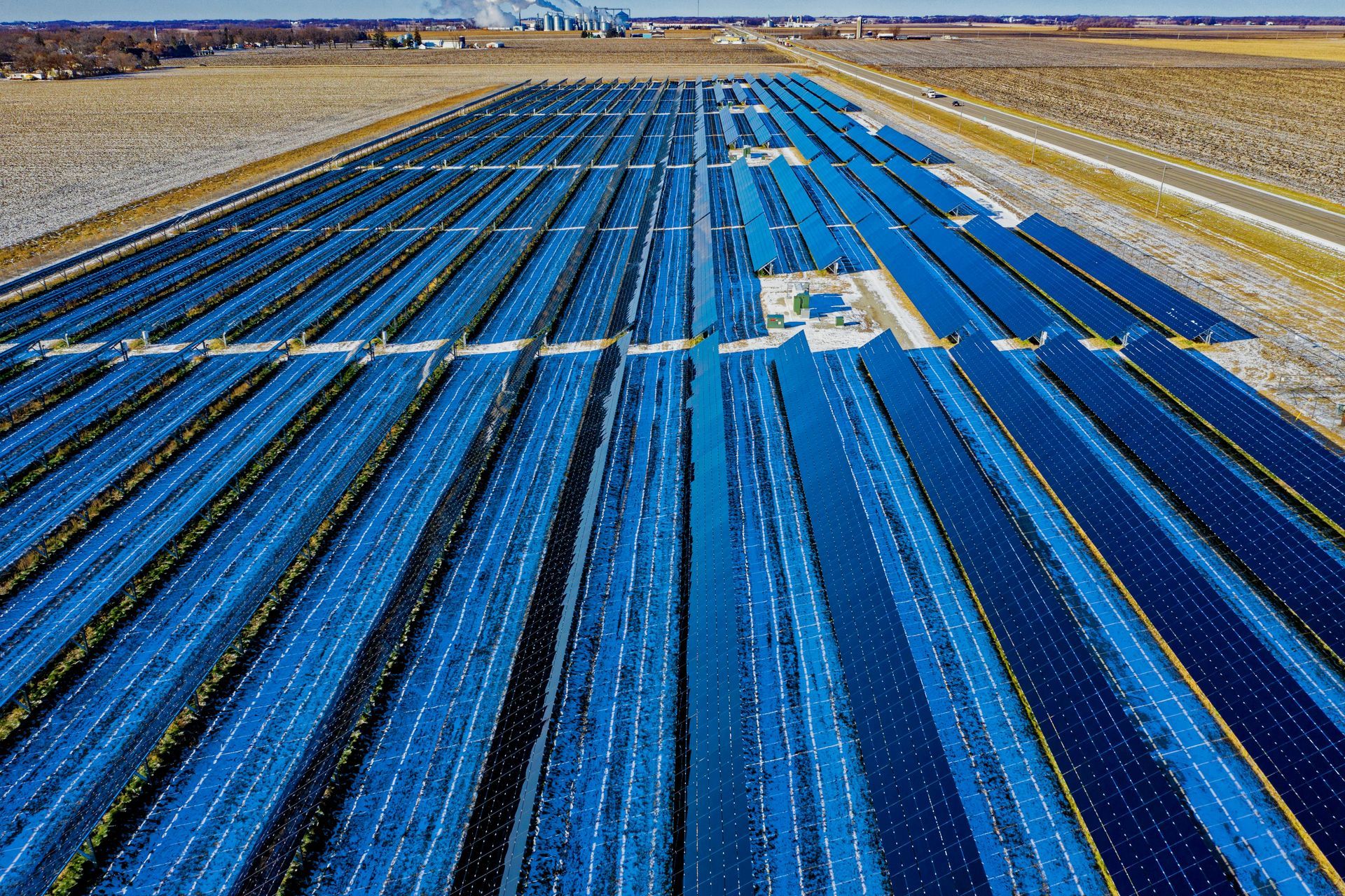What Is Climate Tech & Why It Matters to Investors
Understanding Climate Tech:
A Sector Redefining Impact Investing
What is climate tech? At its essence, climate tech refers to the broad category of technologies developed to combat climate change by either directly reducing greenhouse gas emissions or mitigating their adverse effects on the environment. This sector encompasses an extensive spectrum of innovations ranging from renewable energy systems and carbon capture technologies to sustainable agriculture and water conservation solutions.
Unlike traditional sectors, climate tech is mission-driven, focused on creating scalable solutions that help societies transition to a low-carbon future. Its significance has grown dramatically since the 2015 Paris Agreement, which aligned nations around the goal of limiting global warming to well below 2°C. The result has been a global surge in demand for clean, efficient, and sustainable solutions to replace fossil fuel-based systems.
Since then, investors have increasingly turned their attention to climate technology, driven not only by the urgency of the climate crisis but by the vast potential for growth. With governments around the world committing billions of dollars to green infrastructure and regulatory frameworks favoring carbon reduction, the sector is poised for exponential expansion.
Key Sectors Within Climate Tech
The scope of climate tech is vast, covering a wide range of industries and innovations, all geared toward addressing various dimensions of carbon emissions and
environmental sustainability.
Clean Energy and Renewable Power
Clean energy represents one of the most mature yet fast-evolving sub-sectors of climate tech. Innovations in solar, wind, geothermal, and biomass energy provide reliable alternatives to carbon-intensive power sources. Advances in energy storage – such as lithium-ion batteries and emerging hydrogen fuel technologies – also enhance the viability of renewable sources by overcoming intermittency issues.
Sustainable Agriculture and Food Systems
The agricultural sector is a significant contributor to greenhouse gas emissions. Climate tech solutions in this area include vertical farming, hydroponics, and biochar production, all designed to enhance productivity while reducing environmental impact.
Carbon Capture and Removal Technologies
Reducing existing atmospheric carbon dioxide is critical for meeting global climate goals. Technologies focused on carbon capture and carbon removal – such as direct air capture systems, soil sequestration, and reforestation – are rapidly advancing.
Sustainable Infrastructure and Water Tech
Green buildings, energy-efficient construction materials, and smart urban planning are other key areas. Climate tech also includes innovations in water purification, stormwater management, and desalination, critical for communities facing water scarcity due to climate shifts.
Transportation and Mobility
Electric vehicles (EVs), autonomous transit systems, and green logistics platforms are transforming how people and goods move. The shift toward electrification and shared mobility is reducing emission levels and opening new avenues for tech companies focused on sustainable transport solutions.
Why Investors Are Paying Attention
The rise of climate tech as a preferred sector for investment can be attributed to a combination of market forces, regulatory support, and changing investor values.
Market Demand and Regulatory Support
The global push for decarbonization, as seen in initiatives like the European Green Deal and the U.S. Inflation Reduction Act, is fueling massive demand for climate tech innovations. Governments are creating favorable conditions for climate tech companies through subsidies, tax incentives, and carbon pricing mechanisms.


Financial Returns and Growth Potential
Climate tech startups are demonstrating strong growth metrics, often outperforming traditional sectors. Venture capital and private equity investments in the sector reached record highs in recent years, reflecting investor confidence in the scalability and profitability of these solutions.
Compared to other emerging sectors, climate tech offers diversified risk, as its applications span energy, agriculture, construction, and beyond. With energy efficiency targets becoming more stringent, companies delivering tangible cost savings and environmental benefits are seeing rapid adoption.
Impact Investing and Social Responsibility
Investors today are increasingly motivated by the opportunity to generate both financial returns and positive social outcomes. Climate tech allows them to contribute to global efforts in mitigating the climate crisis while benefiting from one of the fastest-growing markets.

Real-World Examples of
Climate Tech in Action
Investing in Begin Anew presents a unique opportunity in the rapidly growing aesthetics and wellness market.
How to Get Involved as an Investor
Investors interested in entering the climate tech space can access opportunities through platforms like CS Access Fund, which specializes in connecting accredited investors with vetted, high-potential projects.
The Investment Process:
- Join the CS Access Fund network to receive access to carefully selected investment opportunities.
- Review comprehensive due diligence reports and performance projections.
- Invest with confidence, knowing each opportunity aligns with stringent financial and impact criteria.
By investing through CS Access Fund, you gain exposure to diversified climate tech portfolios that support innovation and sustainability. Opportunities range from growth-stage companies to established climate tech ventures ready for expansion.
Contact Us Today To Get Started and become part of the solution to the world’s most pressing environmental challenges.
Evolution from Clean Tech to Climate Tech
In the early 2000s, clean tech saw rapid investment, but many ventures failed due to high costs, unproven technologies, and weak policy support. The sector lacked scalability and struggled with limited market readiness, leading to poor returns for many early investors.
Today, climate tech has emerged stronger, driven by advances in technology, lower production costs, and robust government backing. Clearer regulations, improved capital efficiency, and scalable business models now define the sector. Investors benefit from a more mature ecosystem, better exit strategies, and a growing global demand for effective climate solutions.


The Role of Software in Climate Tech
While hardware such as solar panels, wind turbines, and energy storage systems often dominate the conversation around climate tech, software plays an equally transformative role in scaling these innovations. The integration of digital tools has accelerated the effectiveness, reach, and adaptability of climate technology across industries.
Data-Driven Efficiency and Monitoring
Software enables real-time monitoring and data analysis, allowing climate tech companies to fine-tune performance, predict system failures, and adjust outputs to match demand. For instance, smart grid technologies use predictive algorithms to manage power distribution, balancing renewable energy inputs with consumption needs. This dynamic balancing reduces waste and enhances energy efficiency.
In agriculture, precision farming tools use satellite imagery, IoT sensors, and AI-driven analytics to optimize water usage, nutrient delivery, and pest control. These technologies reduce the sector's environmental impact while maintaining high productivity, supporting climate tech solutions aimed at sustainable food systems.
Climate Risk Modeling and Financial Tools
Investors and companies are increasingly relying on software for climate risk assessment. These tools analyze geographical, environmental, and market data to project how climate change could impact assets, supply chains, or regulatory exposure. This allows more informed investment decisions in both mitigation and adaptation projects.
Carbon accounting software also plays a growing role in helping businesses track and reduce their carbon emissions. These platforms provide transparency and help organizations align with emerging standards like the Task Force on Climate-related Financial Disclosures (TCFD), reinforcing the accountability of climate tech strategies.
Software-Enabled Carbon Markets
Blockchain and other decentralized technologies are being used to create transparent, verifiable carbon removal credits. These digital platforms help connect a climate tech startup with other companies seeking to offset their carbon dioxide output, streamlining the carbon credit lifecycle and promoting wider adoption of carbon capture practices.
Software’s role continues to evolve, offering scalable, lower-capital-intensive entry points for innovation in climate tech. For investors, this means more diversified opportunities, particularly in tech companies leveraging SaaS models to drive environmental impact.

Market Growth and Investment Opportunities in Climate Tech
According to Spherical Insights, the global climate tech market was valued at approximately $19.3 billion in 2023 and is projected to reach $162.2 billion by 2033, reflecting a compound annual growth rate (CAGR) of 23.72% over the forecast period. This growth is supported by global climate policies, corporate sustainability goals, and increased capital flow into green technologies.
Investment in climate tech startups has accelerated, driven by the urgent need for scalable solutions to reduce emissions and adapt to the effects of climate change. Governments worldwide are implementing policies that promote innovation in this space, while corporations are committing to net-zero targets, boosting demand for effective climate tech solutions.
High-growth areas within the sector include renewable energy storage and distribution, where advancements in battery systems, smart grids, and hydrogen are reshaping energy infrastructure. The development of advanced carbon capture technologies – including direct air capture and industrial carbon utilization – is another key focus, offering long-term opportunities for reducing atmospheric carbon dioxide.
The production of sustainable materials and innovations in clean technology manufacturing are creating new investment paths as well. These include eco-friendly building materials, efficient recycling systems, and low-emission industrial processes.
Emerging markets – particularly in Asia and Latin America – are becoming increasingly attractive for investors. Rapid urbanization, rising energy needs, and strong government support for clean infrastructure are making these regions significant hubs for cleantech innovation and deployment.
What CS Access
Fund Offers Investors
At CS Access Fund, we specialize in connecting accredited investors with vetted, high-potential opportunities in the fast-growing climate tech sector. Our focus is not just on financial returns, but on supporting impactful technologies that address the root causes and effects of climate change.
Contact Us Today To Get Started and discover how your investments can fuel innovation, combat the climate crisis, and deliver long-term value. Join a growing network of investors committed to impact, growth, and leadership in one of the most important sectors of our time.

